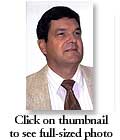James T. Parker
Division of Adult Education and Literacy, Adult Education Program Specialist 1970-Present
INTERVIEWER: Cuba Miller
DATE: October 3, 2001
CM: CASAS started its system in 1980 and had the first test ready to use by 1982. Also in 1982, California issued their mandate.
JP: Ah, yes.
CM: For implementation of a CBAE program in order to be eligible to receive the state's [federal] funds. Did that make any kind of an impact nationwide, or did it kind of float under the radar?
JP: It raised a lot of eyebrows, so I guess it wasn't totally under the radar. Actually, it was, I think, a bit shocking to some states. My remembrance of it is that it involved the federal funds going to local [agencies], which was then called Section 306 of the Adult Education Act. I think it encouraged some states, like Maryland, to make more of an investment and to see that they had, in all states, including California, had a ways to go for this to really take hold. There had to begin to be professional development systems in place. There had to be a way of assessing learning, and such. I know Don McCune felt the mandate, as shocking as it was to some systems both personally and structurally, had to happen or it would be always an uphill battle just to promote and convince adult educators that this was a good way to improve programs and promote learning. It wasn't enough. There really had to be structure and teeth behind it. It was a gamble, and he admitted that. I remember him saying to me, "Jim, we're making a big gamble, and we're betting it's going to pay off".
I think Don also, more than most state directors, had a real good sense of what he called the leverage principle. The leverage principle — who was it that said if you have a big enough lever, you can move the world, and that's what he was trying to do (chuckles), at least that part of the world. So the policy, backed up by support and funding, a strong mandate and support system and training and all those things that go with making anything really work, it has to start with policy. That's one end of the lever. At the other end, a lot of change happens.

